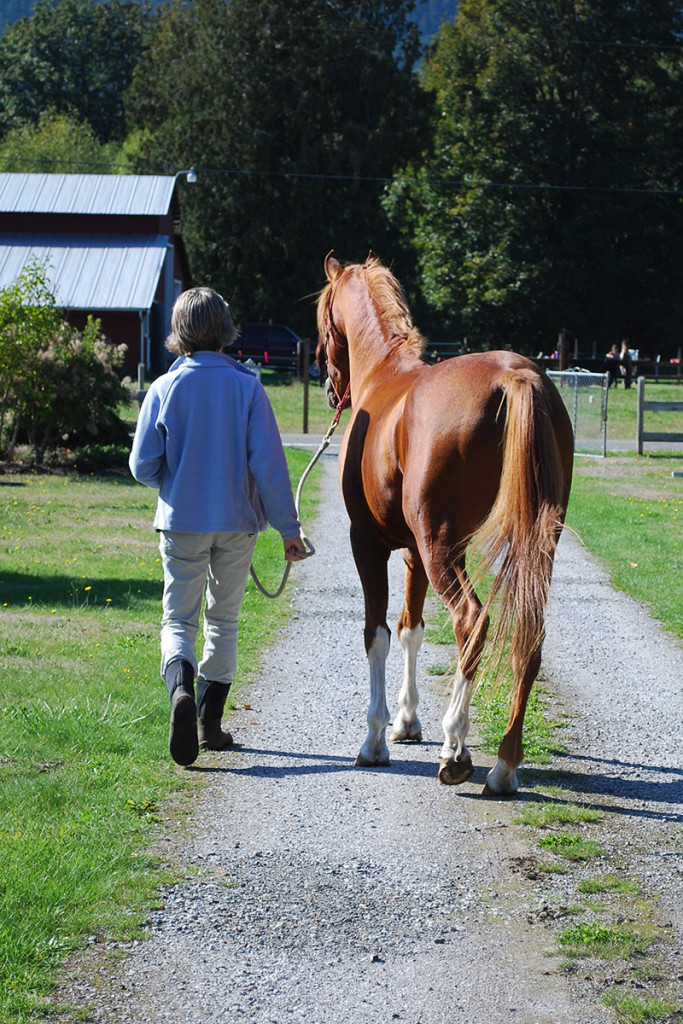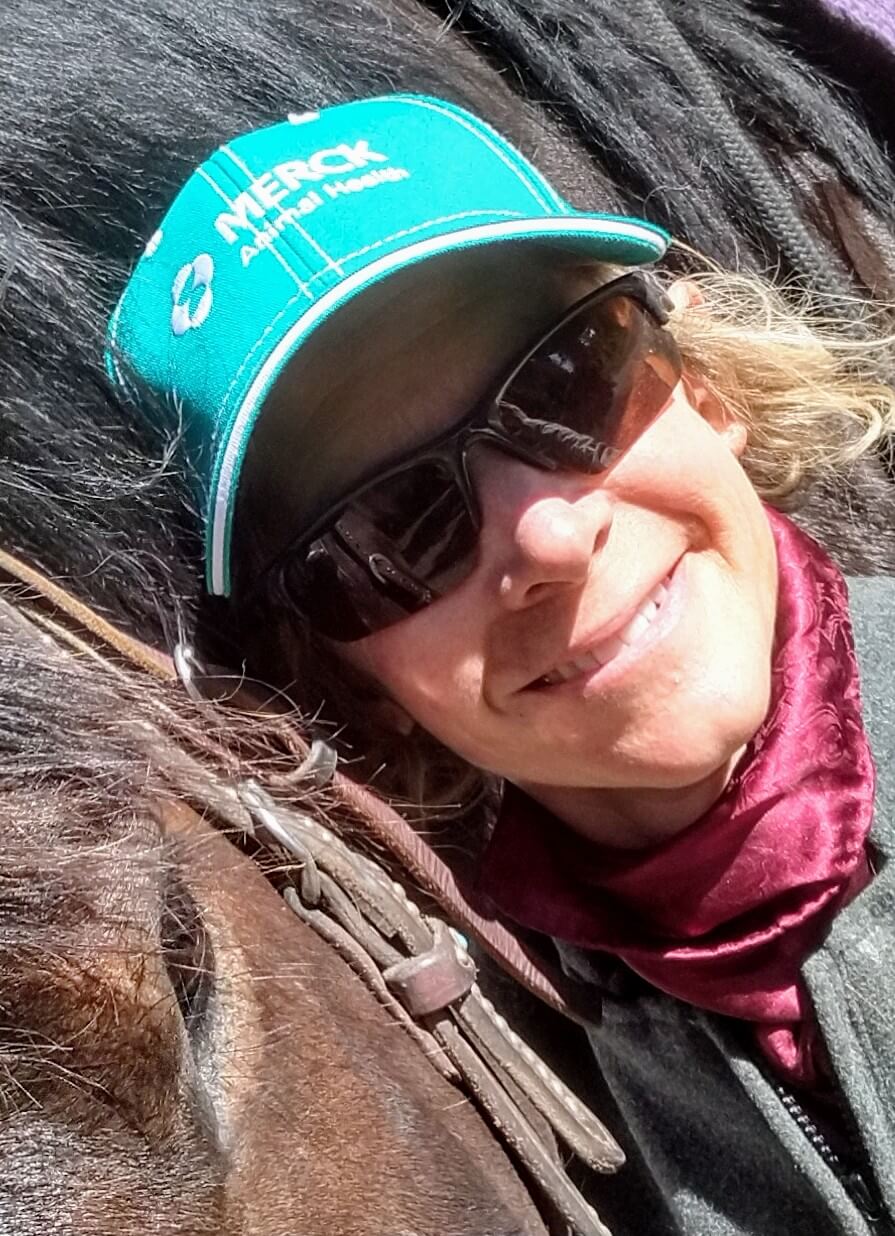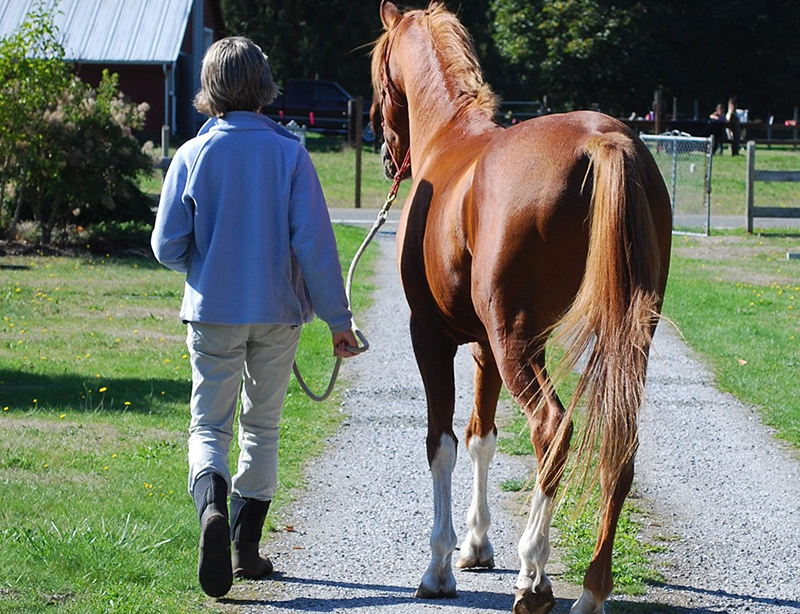by Laura Schonberg

As I go galloping in to the more mature years of my life, I have become much more reflective about my horsemanship. My action-oriented nature is often in conflict with my horses’ natural state that seeks quiet. I easily miss what my horse is telling me and push ahead with my goals, like last week…
We had just gotten back to the barn from a trail ride, me on my young mare and a relatively new teenage rider (Cassidy) who had spent the afternoon on my gelding. I was hosing down Poema (which usually involves Z the gelding nosing in on us the entire time), when I noticed out of the corner of my eye that Cassidy was “leading” Z around the pen. She had no halter, no rope, just a quiet presence that he wanted to be a part of. While I do spend time working with my horses at liberty, I was humbled at how quickly Z was able and willing to connect with Cassidy. I realized how often I am in a hurry and miss out on key opportunities to connect with my horses in small ways that clearly are meaningful to them. Since then, I’ve identified four practices that improve connection:
Taking Note. In the dark months, when my mid-week contact with the horses consists of seeing the whites of their eyes and that they’re upright, there is a lot more I can pay attention to if I take a few extra minutes. How is their attitude toward me? Is Z “happy” to see me, with forward ears and a bright eye? Does Poema center up and wait for me to approach? Or, are they agitated, giving me the cold shoulder (or rump)? If my horses ignore me, even mildly, I need to take a few minutes and connect their minds to their feet to create a positive mental attitude.
Taking Time. To support positive contact, I need to make sure I do have enough time (even if it’s minutes). This means I’m not rushed and am mentally present, willing and able to work for a positive connection. If I do my part right, this should take only moments. If I’m pushy, or intent on making something happen, it could take the rest of the evening.
Taking Care. My horses are very different in personality and position in the herd. I need to keep their personal needs and strengths in mind when asking them to be with me. Z is incredibly watchful and gets worried easily. When I am in a hurry, he often becomes defensive. I can support him so easily if I just take a few moments to check in with him and help him achieve a positive attitude. Poema is a follower so when I am mindful and subtle it really takes so little for her to be willing to respond to cues. I also need to be prepared to support each of them immediately when I ask them to move out of my space or follow my lead. For Z, I need to be mindful that he is not moving my feet with his large presence. For Poema, I need to have her focus and be ready to respond to what she offers.
Taking What’s Offered. This includes in the dark, under the glare of the barn lights. I want to be mindful of the small things I can do while in their space—the barn/stalls/corral. Most specifically, for the big horse that he moves out of my space and doesn’t push into me and that when I walk into the pen he is pleasant and respectful (which may necessitate carrying a flag to support good choices). For my young mare, she should be willing to face up to me, not hide behind the big horse. I have also been known to throw a halter on a couple of horses while I clean the pen so they can “help” (they get to follow me softly and willingly on the end of the lead line), a great opportunity to move on a feel with me, while I’m scooping and maneuvering the wheel barrow. They get to watch their manners with each other, with me, and with my equipment. Not to mention waiting patiently at the gate until they’re released.
I miss the bright, warm nights of our very long summer, but taking the time to build positive horse attitudes in the winter months helps pass the time and create good habits. Something is better than nothing, and horsemanship is twelve months a year!
Published in December 2015 Issue

Thankful to call the Pacific Northwest home, Laura Schonberg is an educator in a local school district and is outside at her place when she isn’t inside at work. Summers are spent cow-girling at a friend’s ranch, with forrays into the Cascade Mountains as time and weather permit year-round. Winter finds her at a local barn doing dressage lessons to support her ranch riding, and re-starting horses through the county’s equine rescue program.


